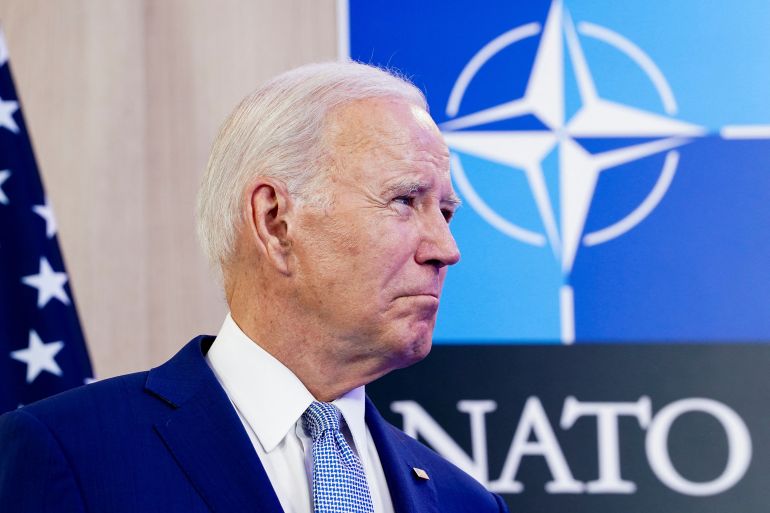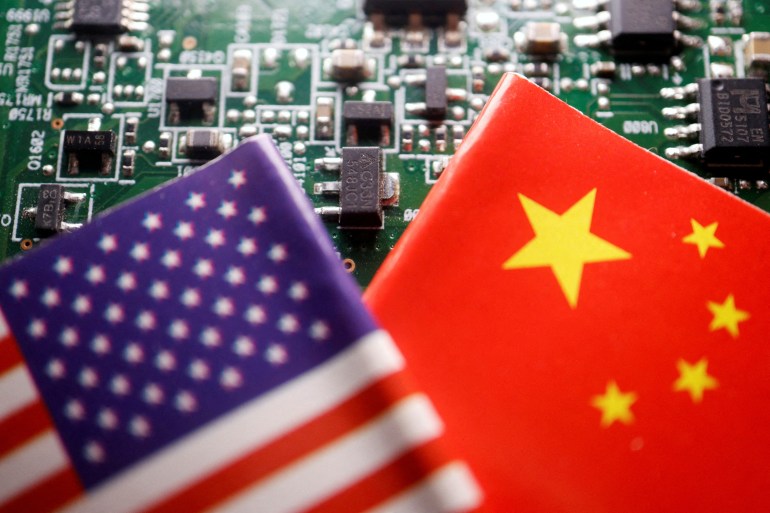Biden issues executive order restricting US investment in Chinese tech
China accuses the Biden administration of pursuing ‘technology hegemony’ and demands that technology curbs be repealed.

President Joe Biden on Wednesday signed an executive order that will narrowly prohibit certain United States investments in sensitive technology in China and require government notification of funding in other tech sectors.
Biden said in a letter to Congress he was declaring a national emergency to deal with the threat of advancement by countries like China “in sensitive technologies and products critical to the military, intelligence, surveillance, or cyber-enabled capabilities”.
Keep reading
list of 4 itemsIndia passes data protection bill amid surveillance concerns
Twitter fined for delay in complying with federal Trump election probe
Robbie Robertson, leader of Canadian-US group The Band, dies at 80
The long-awaited order authorises the US treasury secretary to prohibit or restrict certain US investments in Chinese entities in three sectors: semiconductors and microelectronics, quantum information technologies, and certain artificial intelligence systems.
Senior administration officials said that the effort stemmed from national security goals, rather than economic interests and that the categories it covered were narrow in scope. The order seeks to blunt China’s ability to use US investments in its technology companies to upgrade its military while also preserving broader levels of trade that are vital for both nations’ economies.
The US and China appear to be increasingly locked in geopolitical competition, along with their deep trade relationship as the world’s two largest economies. Biden administration officials have insisted that they have no interest in “decoupling” from China. Yet, the US has limited the export of advanced computer chips, sought to limit investments in China and kept the expanded tariffs set up by former President Donald Trump.
The move could fuel tensions between the world’s two largest economies, although US officials insisted the prohibitions were intended to address “the most acute” national security risks and not to separate the two countries’ highly interdependent economies.
Senate Democratic Leader Chuck Schumer praised Biden’s order, saying: “For too long, American money has helped fuel the Chinese military’s rise. Today the United States is taking a strategic first step to ensure American investment does not go to fund Chinese military advancement.” He said Congress must enshrine restrictions in law and refine them.
Al Jazeera’s Shihab Rattansi said these restrictions, according to the White House, are a result of two years of internal deliberations.
“There are already restrictions on the export of some of these technologies. They are trying to prevent indigenisation of China’s capabilities to become master in sensitive technology,” he said from Washington DC.
“There are several caveats though, this will affect new investments, existing ones won’t be affected.”

The order is aimed at preventing US capital and expertise from helping develop technologies that could support China’s military modernisation and undermine US national security. It is focused on private equity, venture capital, joint venture and greenfield investments.
Most investments captured by the order will require the government to be notified about them. Some transactions will be prohibited. Treasury said it anticipates exempting “certain transactions, including potentially those in publicly-traded instruments and intracompany transfers from US parents to subsidiaries”.
‘Technology hegemony’
“This is another expression of American anxiety if not desperation to try to squelch China’s economic technological rise,” said Andy Mok, a senior research fellow with the Center for China and Globalisation, a think tank based in Beijing.
“China, which has been preparing for this eventuality for years, has invested in developing a formidable technology innovation ecosystem, including not only abundant capital but increasingly sophisticated expertise around cultivating companies in terms of turning technologies into actual products and services,” he said.
“And the latest Biden administration restrictions are targeting: venture capital and private equity firms that not only provide capital but also provide expertise on how to grow companies and help them be successful.”
China’s foreign ministry accused the Biden administration of pursuing “technology hegemony” and demanded Washington “immediately revoke its erroneous decision”.
Washington’s “true purpose is to deprive China of its development rights and maintain its own hegemony,” the ministry said on Thursday.
A spokesperson for the Chinese embassy in Washington, Liu Pengyu, warned on Wednesday that China would take steps to “safeguard” its rights.
Al Jazeera’s Katrina Yu, reporting from Beijing, said that China is gravely concerned by the US decision.
“The commerce ministry said that the latest curbs will disrupt global supply chains. The Chinese embassy in Washington DC accused the US of overusing the reason of national security to politicise and weaponise trade,” she said.
“The latest step will surely complicate efforts to stabilise ties between Washington and Beijing.”
The Biden administration said it engaged with US allies and partners as it developed the restrictions “and will continue coordinating closely with them to advance these goals”. It added the executive order reflects discussions with the Group of Seven (G7) countries.
It is expected to be implemented next year, a person briefed on the order said, after multiple rounds of public comment, including an initial 45-day comment period.
Regulators plan to issue an advance notice of proposed rulemaking to further define the scope of the programme and a comment period to solicit public feedback before making a formal proposal.
Emily Benson of the Center for Strategic and International Studies (CSIS), a bipartisan policy research organisation, said she expects investments in artificial intelligence to be prohibited to military users and uses and that other investments in the sector will only require notification to the government.
Benson said the burden will fall on the administration to determine what AI technologies fall into the military category.